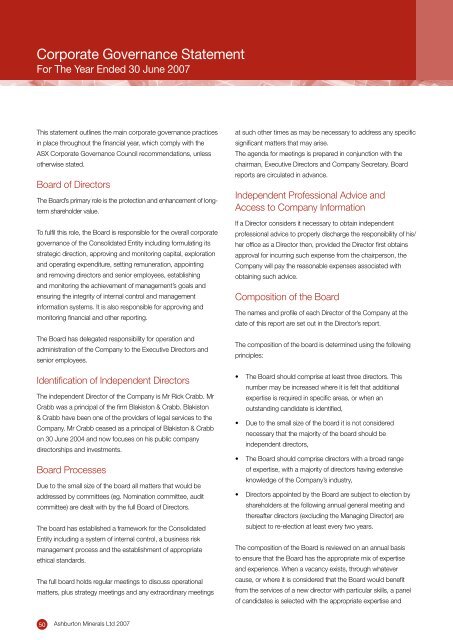ANNUAL REPORT - Ashburton Minerals
ANNUAL REPORT - Ashburton Minerals
ANNUAL REPORT - Ashburton Minerals
- No tags were found...
Create successful ePaper yourself
Turn your PDF publications into a flip-book with our unique Google optimized e-Paper software.
Corporate Governance Statement<br />
For The Year Ended 30 June 2007<br />
This statement outlines the main corporate governance practices<br />
in place throughout the financial year, which comply with the<br />
ASX Corporate Governance Council recommendations, unless<br />
otherwise stated.<br />
Board of Directors<br />
The Board’s primary role is the protection and enhancement of longterm<br />
shareholder value.<br />
To fulfil this role, the Board is responsible for the overall corporate<br />
governance of the Consolidated Entity including formulating its<br />
strategic direction, approving and monitoring capital, exploration<br />
and operating expenditure, setting remuneration, appointing<br />
and removing directors and senior employees, establishing<br />
and monitoring the achievement of management’s goals and<br />
ensuring the integrity of internal control and management<br />
information systems. It is also responsible for approving and<br />
monitoring financial and other reporting.<br />
The Board has delegated responsibility for operation and<br />
administration of the Company to the Executive Directors and<br />
senior employees.<br />
Identification of Independent Directors<br />
The independent Director of the Company is Mr Rick Crabb. Mr<br />
Crabb was a principal of the firm Blakiston & Crabb. Blakiston<br />
& Crabb have been one of the providers of legal services to the<br />
Company. Mr Crabb ceased as a principal of Blakiston & Crabb<br />
on 30 June 2004 and now focuses on his public company<br />
directorships and investments.<br />
Board Processes<br />
Due to the small size of the board all matters that would be<br />
addressed by committees (eg. Nomination committee, audit<br />
committee) are dealt with by the full Board of Directors.<br />
The board has established a framework for the Consolidated<br />
Entity including a system of internal control, a business risk<br />
management process and the establishment of appropriate<br />
ethical standards.<br />
The full board holds regular meetings to discuss operational<br />
matters, plus strategy meetings and any extraordinary meetings<br />
at such other times as may be necessary to address any specific<br />
significant matters that may arise.<br />
The agenda for meetings is prepared in conjunction with the<br />
chairman, Executive Directors and Company Secretary. Board<br />
reports are circulated in advance.<br />
Independent Professional Advice and<br />
Access to Company Information<br />
If a Director considers it necessary to obtain independent<br />
professional advice to properly discharge the responsibility of his/<br />
her office as a Director then, provided the Director first obtains<br />
approval for incurring such expense from the chairperson, the<br />
Company will pay the reasonable expenses associated with<br />
obtaining such advice.<br />
Composition of the Board<br />
The names and profile of each Director of the Company at the<br />
date of this report are set out in the Director’s report.<br />
The composition of the board is determined using the following<br />
principles:<br />
• The Board should comprise at least three directors. This<br />
number may be increased where it is felt that additional<br />
expertise is required in specific areas, or when an<br />
outstanding candidate is identified,<br />
• Due to the small size of the board it is not considered<br />
necessary that the majority of the board should be<br />
independent directors,<br />
• The Board should comprise directors with a broad range<br />
of expertise, with a majority of directors having extensive<br />
knowledge of the Company’s industry,<br />
• Directors appointed by the Board are subject to election by<br />
shareholders at the following annual general meeting and<br />
thereafter directors (excluding the Managing Director) are<br />
subject to re-election at least every two years.<br />
The composition of the Board is reviewed on an annual basis<br />
to ensure that the Board has the appropriate mix of expertise<br />
and experience. When a vacancy exists, through whatever<br />
cause, or where it is considered that the Board would benefit<br />
from the services of a new director with particular skills, a panel<br />
of candidates is selected with the appropriate expertise and<br />
50<br />
<strong>Ashburton</strong> <strong>Minerals</strong> Ltd 2007


